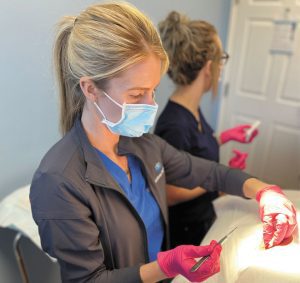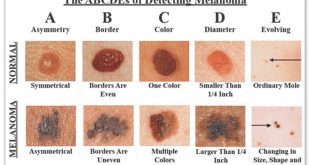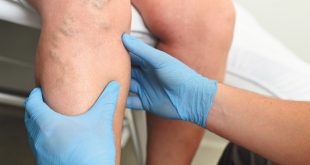By Casey Overturf, PA-C
 The importance of a good skin care routine might sound unnecessary these days with some of the “quick fix” options available and full coverage makeup. To be honest, there are very few truly “quick fixes” when it comes to our skin. Even some of the amazing procedures that are offered by medical professionals will not be nearly as beneficial without the proper maintenance and follow up. Not to mention that full coverage makeup used to cover your flaws for one night might cause a week of breakouts without the proper skincare. Our skin is the largest organ in our body as you know and we must take care of it. The good news is taking care of it can be easy when you have a routine that’s right for you. This applies to anyone who struggles with a dermatological condition such as acne, dandruff, skin cancer, those fighting signs of aging, and so many more.
The importance of a good skin care routine might sound unnecessary these days with some of the “quick fix” options available and full coverage makeup. To be honest, there are very few truly “quick fixes” when it comes to our skin. Even some of the amazing procedures that are offered by medical professionals will not be nearly as beneficial without the proper maintenance and follow up. Not to mention that full coverage makeup used to cover your flaws for one night might cause a week of breakouts without the proper skincare. Our skin is the largest organ in our body as you know and we must take care of it. The good news is taking care of it can be easy when you have a routine that’s right for you. This applies to anyone who struggles with a dermatological condition such as acne, dandruff, skin cancer, those fighting signs of aging, and so many more.
I will provide some ideal routines both in office and at home for various dermatology concerns below that will ensure optimal results!
Are you concerned about skin cancer?
If you have a recent history of skin cancer you should be having a skin cancer screening every 3-6 months to ensure another one isn’t popping up. If no history of skin cancer then once a year is appropriate. At home you should be applying a sunscreen every morning and every 90 minutes if spending a fun day out in the sun.
Do you struggle with acne?
You will likely see your dermatology provider every 2-3 months at first, but once we find the right plan for you it may be only every 6-12 months. For your at-home routine, the saying “less is more” applies. You don’t want to over exfoliate or over dry your skin. Use a dermatologist recommended facewash and moisturizer that is non-comedogenic (meaning it won’t clog your pores) every morning and night. The facewash may include a benzoyl-peroxide, glycolic acid, or salicylic acid. However, you will likely benefit most from a prescription strength topical retinoid, which is the first line treatment for acne. This will be applied as a pea-sized amount for the whole face every night.
Do you want to prevent or reverse signs of aging?
There are many in-office procedures available such as Botox/Dysport, fillers, chemical peels, lasers, etc. Botox or Dysport will prevent and soften fine lines and wrinkles and treatments are recommended every 3-5 months, it varies person to person on how long it lasts. For chemical peels and lasers treatments are done every 4-6 weeks until desired results are achieved and then every 3-6 months for maintenance. Fillers are used to treat volume loss and deep wrinkles and typically lasts 6 months to a year depending on the filler chosen and the area being treated. While in-office routines can greatly improve our skin, a solid at home routine can too! My favorite daily routine is starting every morning with a glycolic acid cleanser, then applying topical vitamin C followed by a moisturizer with spf. At night I recommend using a hydrating cleanser, applying a prescription strength topical retinoid and then finish with a moisturizer that includes hyaluronic acid.
Do you have flares of eczema?
If so you may need to see your dermatologist every 2-4 weeks until it is under control. Once it has calmed down and you have a maintenance treatment plan, you should come in every 6-12 months. An at-home daily routine is key for preventing eczema, just like many other conditions of the skin. Avoiding fragranced lotions, soaps, and detergents and long hot showers combined with dermatologist recommended moisturizers 2-3 times a day. For some, you may also require a prescription strength topical steroid for flares or non-steroidal cream for prevention.
If you implement a solid skin care routine no matter the concern you will find your skin is more hydrated, the tone is even and the texture is smoother on a daily basis AND… you will maintain your results! If any of this sounds daunting and you don’t know what to do because there are thousands of skincare products available these days, then please schedule an appointment with your dermatology provider. We can form a routine that is completely catered to your skin and your desired outcome!
MidState Skin Institute Services:
Medical Dermatology
The science of treating the skin, hair, and nails to relieve or cure skin disorders.
Surgical Dermatology
The practice of dermatology that specializes in surgical procedures & minimally invasive techniques to treat skin cancer.
Cosmetic Dermatology
The practice of improving the look and health of one’s skin through medical or surgical procedures, to help patients look and feel their best.
Aesthetics
Treatment for the skin, hair or body that is meant to enhance the appearance of patients through minimally invasive techniques & personalized topical skin care recommendations.
 Central Florida Health and Wellness Magazine Health and Wellness Articles of the Villages
Central Florida Health and Wellness Magazine Health and Wellness Articles of the Villages



